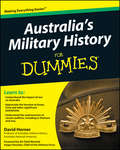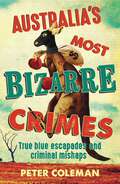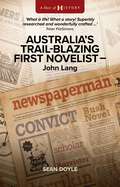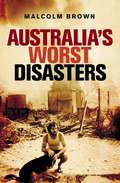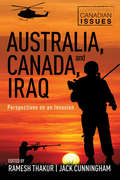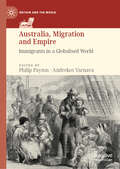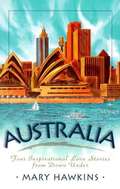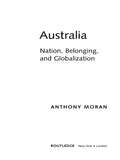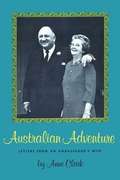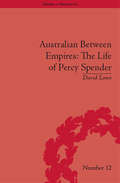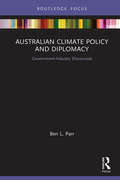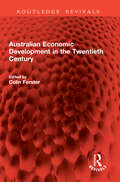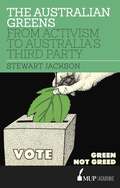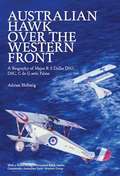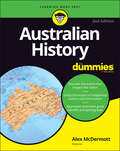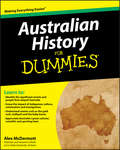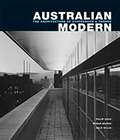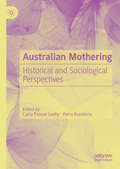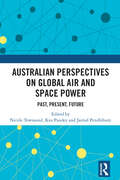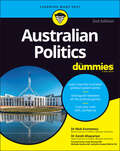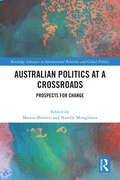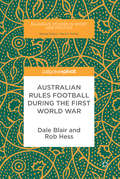- Table View
- List View
Australia's Military History For Dummies (For Dummies Ser.)
by David HornerCreated especially for the Australian customer! The simple and easy way to get your mind around Australia's military history More people are visiting Gallipoli and walking the Kokoda Trail each year — now find out why. This complete guide helps you trace the story of Australia's involvement in war, from the colonial conflicts with the Indigenous population, through the World Wars to peacekeeping initiatives in East Timor and the controversial conflict in Afghanistan. Find out the origins of Australia's military history — go all the way back to the arrival of the First Fleet and the conflicts with the Indigenous peoples Learn about the heroism of the Anzacs — discover the origins of the legend of Gallipoli, and how the brass bungled the campaign Discover the horrors of war — consider the suffering and huge losses on the Western Front Recognise the successful battles of World Wars I and II — follow the Diggers' exploits in Palestine and Syria, and at Tobruk and Alamein Marvel at the grim jungle battles — track the Diggersthrough New Guinea, Borneo, Malaya and Vietnam between 1942 and 1972 Admire Australia's efforts to repel possible invaders — learn how Australians defended their country against the Japanese during World War II See how the Cold War heated up — witness the fight against communism in the Korean and Vietnam Wars Appreciate the modern-day Australian Defence Force — acknowledge the courage of the men and women who protectus into the 21st century Open the book and find: New insights into the meaning of Anzac Day Simple explanations of the structure of Australia's military Details of who fought whom, where, when and why Stories of Australia's great military fighters and leaders Accounts of the iconic battles that established Australia's reputation Locations of Australia's peacekeeping operations around the world Ways in which war and conflict have shaped the nation Reasons why Australia goes to war Learn to: Comprehend the impact of waron Australia Appreciate the heroism at AnzacCove and other significant battlefields Understand the controversies ofrecent conflicts, including in Vietnam and Iraq
Australia's Most Bizarre Crimes
by Peter ColemanTrue tales of crimes so bizarre you might not believe them.The mysterious disappearance of thousands of false teeth, international travel via the postal system, doughnut delivery heists, clowns terrorising a neighbourhood, the theft of a three-storey-high replica mango, criminal clairvoyants making off with haunted cash: could crime get any weirder, and could people get any stupider?In Australia's Most Bizarre Crimes, Peter Coleman explores the archives and recent records to produce this astounding collection of criminal mishaps that will have you laughing even as you shake your head in disbelief.
Australia's Most Bizarre Crimes
by Peter ColemanTrue tales of crimes so bizarre you might not believe them.The mysterious disappearance of thousands of false teeth, international travel via the postal system, doughnut delivery heists, clowns terrorising a neighbourhood, the theft of a three-storey-high replica mango, criminal clairvoyants making off with haunted cash: could crime get any weirder, and could people get any stupider?In Australia's Most Bizarre Crimes, Peter Coleman explores the archives and recent records to produce this astounding collection of criminal mishaps that will have you laughing even as you shake your head in disbelief.
Australia's Trail-Blazing First Novelist: John Lang
by Sean Doyle'Writer, journalist, barrister, larrikin' Who was the first Australian novelist? John Lang, born in a Parramatta pub in 1816 with the convict &‘stain&’ upon him, was a singular character. The first native-born person to have a novel published, he was also a newspaperman, a classical scholar and translator, barrister, celebrity, jailbird … enigma. He was hugely energetic, capable and original, but he also had his demons. A larrikin polymath who refused to be bound by convention, Lang didn&’t just want his allotted portion – he wanted all of it. He got a lot of it, too, but not the chalice of immortality. Lang was a serial pioneer. In literature, he also wrote the first &‘detective novel&’ in English, the first convict-system satire, the first Indian travelogue by an Australian, and he created the template for the bush novel. In journalism, he was the first Australian to launch and run a newspaper overseas. And in law, he was the only barrister to ever defeat the mighty East India Company in an Indian courtroom. So why have we never heard of him? This long-overdue biography explores answers to this revealing question as it tracks Lang&’s rise from those humble beginnings to fortune and fleeting fame. Author Sean Doyle tells the riveting story of Lang&’s remarkable life and times across three continents in the age of Empire, when the modern world was young …
Australia's Worst Disasters
by Malcolm BrownGraphic accounts of Australia?s worst disasters ? historical as well as events of recent years.From the Ash Wednesday bushfires of 1983 to the implosion of the Royal Canberra Hospital in 1997, and from the shocking Granville railway crash in 1977 to the Sea King helicopter crash of 2005, Australia's history has been punctuated by incidents of disaster and tragedy that have shocked us all. Sometimes warning signs were not read (or were ignored); sometimes human error was to blame. These graphic and compelling accounts by veteran Sydney Morning Herald journalist Malcolm Brown and other award-winning journalists tell us far more than simply what happened - they provide unique insights into the impact of these events on the lives of innocent people. And, interspersed with stories of death and destruction, are heart-warming accounts of courage, grace and just plain good luck.
Australia, Canada, and Iraq: Perspectives on an Invasion
by Ramesh Thakur Jack CunninghamA collection of essays on the war in Iraq; including pieces by Jean Chrétien and John Howard, the prime ministers during the war. When it was declared in 2003, the U.S.-led invasion of Iraq was intensely controversial. While a few of America's partners, like Australia, joined in the war, many, including Canada, refused to take part. However the war in Iraq was viewed at the time, though, it is clear that that war and the war in Afghanistan have had a profound and lasting impact on international relations. Australia, Canada, and Iraq collects essays by fifteen esteemed academics, officials, and politicians, including the prime ministers of Australia and Canada at the time of the war — John Howard and Jean Chretién, respectively. This volume takes advantage of the perspective offered by the decade since the war to provide a clearer understanding of the Australian and Canadian decisions regarding Iraq, and indeed of the invasion itself.
Australia, Migration and Empire: Immigrants in a Globalised World (Britain and the World)
by Andrekos Varnava Philip PaytonThis edited collection explores how migrants played a major role in the creation and settlement of the British Empire, by focusing on a series of Australian case studies. Despite their shared experiences of migration and settlement, migrants nonetheless often exhibited distinctive cultural identities, which could be deployed for advantage. Migration established global mobility as a defining feature of the Empire. Ethnicity, class and gender were often powerful determinants of migrant attitudes and behaviour. This volume addresses these considerations, illuminating the complexity and diversity of the British Empire’s global immigration story. Since 1788, the propensity of the populations of Britain and Ireland to immigrate to Australia varied widely, but what this volume highlights is their remarkable diversity in character and impact. The book also presents the opportunities that existed for other immigrant groups to demonstrate their loyalty as members of the (white) Australian community, along with notable exceptions which demonstrated the limits of this inclusivity.
Australia: Four Inspirational Love Stories from the Land Down Under
by Mary HawkinsGo down under with a contemporary collection of four complete novels and one novella. Starting in Search for Tomorrow, readers will follow Gail as she rebuilds her life after a tragedy takes the ones she loves. In Search for Yesterday, they will sympathize with Hilda when she learns she has a father she never knew and strength that had never been tested before. They will root for Beth and Art when they attempt to rebuild a broken body and marriage in Search for Today. Then, in the novella, Search for the Star, the readers will explore Jean's second chance with an old love.
Australia: Nation, Belonging, and Globalization (Global Realities #Vol. 1)
by Anthony MoranIn this book Anthony Moran traces the development of contemporary Australian society in the global age, focusing on four major themes: settler/indigenous relations; economics and culture since the 1980s and their impact on national identity; the effects of increasing diversity fostered by globalization; and the transformation of Australian social space wrought by globalization.
Australian Adventure: Letters from an Ambassador's Wife
by Anne ClarkFrom August 1965 to February 1968, during his period of service in Australia, Ambassador Edward Clark traveled in that country as no other American and probably few Australians ever have. His wife, Anne Clark, traveled with him, then wrote her observations and impressions to friends and family in the United States. Her letters, published for the first time in this volume, reveal the isolations and involvements as well as the opportunities and the pleasures of embassy life. The etiquette of official functions at times posed problems, as in the Clarks' first black-tie dinner with the Acting Governor General, where Mrs. Clark was supposed to curtsy. "Some Ambassadors feel strongly that the representative of the President of the United States should never bend his knee (or rather his wife's) to any man. Mrs. Battle, wife of our predecessor . . . put the question directly to President Kennedy. His answer to her was, 'Curtsy you must, but keep a stiff upper knee. '" Soon, Anne Clark realized that the routine of appearances and entertainments was constant: "I do not know when I will make peace with the schedule. I am a slave to the little black book that is my calendar. " In addition to the intricacies of embassy life, the Clarks encountered much that was unfamiliar-new people, almost a new language, new flowers, new animals-even a sky with its new moon upside down. But their warm hospitality and genuine interest in things Australian attracted friends throughout the continent. Figures from the government, the church, the diplomatic circle, and everyday life, plus well-known guests from home, all become known to the reader in this perceptive account of official life from the inside.
Australian Battalion Commanders In The Second World War
by Garth PrattenThis book explores the background, role and conduct of the commanding officers of Australian infantry battalions in World War II.
Australian Between Empires: The Life Of Percy Spender (Empires in Perspective #12)
by David LowePart biography, part transnational history, this study details the life and career of Percy Spender, one of Australia's most prominent twentieth-century political figures.
Australian Climate Policy and Diplomacy: Government-Industry Discourses (Routledge Focus on Environment and Sustainability)
by Ben L. ParrAustralian Climate Policy and Diplomacy provides a well overdue critique of existing, and high-profile, publications that convey the ‘greenhouse mafia’ hypothesis, which posits that Australia’s weak policy response to climate change is the result of a menacing domestic fossil fuel lobby. Ben L. Parr argues that the shared government–industry discourse about protecting Australia’s industrial competitiveness has had a more decisive influence in shaping and legitimising Australian climate policy than the direct lobbying tactics of the fossil fuel industry. Parr also reveals how the divergent foreign policy discourses and traditions of Australia’s two major political parties – as internationalist versus alliance-focused – have enabled and constrained their climate diplomacy and domestic policies over time. To demonstrate his argument, he presents a discourse analysis woven into a chronological policy narrative, comprising more than 1000 primary texts (media releases, interviews, and speeches) generated by prime ministers and key fossil fuel lobbyists. Overall, this volume illustrates how domestic forces have and are influencing Australia’s climate policy. In doing so, it also provides a framework that can be adapted to examine climate mitigation policies in other countries, notably Canada and the US. This book will be of interest to students and scholars of climate change, environmental policy and governance, and Australian climate change policy and politics more specifically, as well as policymakers and practitioners working in these fields.
Australian Economic Development in the Twentieth Century (Routledge Revivals)
by Colin ForsterFirst published in 1970, Australian Economic Development in the Twentieth Century analyses aspects of Australian economic development in the twentieth century and places them in historical and international perspective. In Australia, the nineteenth century has been studied much more intensively than the twentieth, and in this latter period the long-run examination of almost any economic topic must break new ground. The main economic histories of the period were written either before the Second World War or come close to general history. Earlier works have naturally dated, and little has been done to integrate the periods before and after the war.The book takes a step towards filling a wide gap in our understanding of Australian development and covers the period from the depression of the 1890s right up to the 1960s. It is the product of a team of Australia’s economic historians working together, but each sovereign on his own special subject. This volume will appeal not only to economic historians but to a wider public interested in Australia’s history.
Australian Greens: From Activism to Australia's Third Party
by Stewart JacksonThe Australian Greens played a pivotal role after the 2010 federal election. It ensured the Gillard minority government went full term and won its first House of Representatives seat. But what do we really know about the Greens in Australia? Is the party really just an extension of the environment movement or a professional party, capable of influencing the major parties? This book examines the people who make the party tick. Uncovers the members and activists of the party. The Australian Greens: From Activism to Australia's Third Party asks whether the Greens has made the transition from a home for tree-huggers and alternative lifestylers to a party ready to work in Government.
Australian Hawk Over the Western Front: A Biography of Major R S Dallas DSO, DSC, C de G avec Palme
by Adrian HellwigThe true story of Australia&’s greatest flying ace and his WWI victories, based on his letters, combat reports, and other documents. Includes photos. Major Roderick Dallas is Australia&’s leading air ace of all time and, with fifty victories, also one of the highest-scoring Commonwealth aces. Yet, until this excellently researched volume, there has never been a full biography of this exceptional pilot, whose fighting career spanned from 1916 to 1918. Flying Nieuport Scouts, Triplanes, and Camels with the RNAS and RAF, he was an ever-present threat over the Western Front and the scourge of the German Air Force. Adrian Hellwig&’s book has been taken principally from primary sources—Dallas&’s own letters, log book, and service record, in addition to squadron record books, combat reports and contemporary accounts—and his resulting conclusions will surprise many. Here is a fitting tribute not just to Australia&’s greatest war hero of the air but to a man any country would be proud to call its own.
Australian History For Dummies
by Alex McDermottExplore the land down under with your friends at Dummies Australia might be most famous for kangaroos, koalas, friendly people, and decidedly unfriendly critters (like the black widow spider, yikes!), but did you know that its government was dismissed by the British Crown in 1975? Or that human beings have lived on the continent for around 65,000 years? In Australian History For Dummies, you???ll discover all that ??? and more ??? as you discover the history of Indigenous Australians, colonial explorers, and the modern inhabitants of one of the most fascinating nations, islands, and continents in the world today!
Australian History for Dummies (For Dummies Ser.)
by Alex McDermottCreated especially for the Australian customer! Exciting and informative history of the land down under Australian History For Dummies is your tour guide through the important events of Australia's past, introducing you to the people and events that have shaped modern Australia. Be there as British colonists explore Australia's harsh terrain with varying degrees of success. In this informative guide you'll Find out about Australia's infamous bushrangers Learn how the discovery of gold caused a tidal wave of immigration from all over the world Understand how Australia took two steps forward to become a nation in its own right in 1901, and two steps back when the government was dismissed by the Crown in 1975 Discover the fascinating details that made Australia the country it is today!
Australian Modern: The Architecture of Stephenson And Turner
by Rowan Wilken Julie Willis Philip GoadAustralian Modern offers a unique pictorial overview of the work of Stephenson & Turner. Their buildings signified the vanguard of Australian modernism and represented the results of the most up-to-date research into building designs for health, commerce and industry. The firm's expertise in hospital architecture, for example, earned them an international reputation, and for Arthur Stephenson, a knighthood and the prestigious RIBA Gold Medal. The sheer quantity and ubiquitous nature of the firm's output, from the 1920s to the 1970s, has affected the lives of countless numbers of everyday Australians. Landmark buildings in Melbourne include the MCG's Members' Stand and Long Room, Jessie McPherson Community Hospital, Mercy Hospital, Freemasons Hospital, St Vincent's Hospital, Royal Banking Chambers of the E. S. & A. Bank, Colonial Mutual Life Assurance Building, and the Royal Melbourne Hospital. Their Sydney buildings are equally impressive, with the United Dental Hospital and the IBM Centre redefining the city's architecture. Stephenson & Turner also worked on several prominent projects as far afield as France, United States, New Zealand, Taiwan, Indonesia, Iraq and South Africa. Australian Modern features drawings and photographs taken from the architectural collections of the State Library of Victoria. Complemented by essays that explore the ideas and innovations behind the firm's success, Australian Modern is an invaluable record of the modernisation of a nation through design.
Australian Mothering: Historical and Sociological Perspectives
by Petra Bueskens Carla Pascoe LeahyThis collection defines the field of maternal studies in Australia for the first time. Leading motherhood researchers explore how mothering has evolved across Australian history as well as the joys and challenges of being a mother today. The contributors cover pregnancy, birth, relationships, childcare, domestic violence, time use, work, welfare, policy and psychology, from a diverse range of maternal perspectives. Utilising a matricentric feminist framework, Australian Mothering foregrounds the experiences, emotions and perspectives of mothers to better understand how Australian motherhood has developed historically and contemporaneously. Drawing upon their combined sociological and historical expertise, Bueskens and Pascoe Leahy have carefully curated a collection that presents compelling research on past and present perspectives on maternity in Australia, which will be relevant to researchers, advocates and policy makers interested in the changing role of mothers in Australian society.
Australian Perspectives on Global Air and Space Power: Past, Present, Future
by Nicole Townsend Kus Pandey Jarrod PendleburyThis book surveys historical and emerging global air and space power issues and provides a multidisciplinary understanding of the application of air and space power in the past and present, as well as exploring potential future challenges that global air forces may face. Bringing together leading and emerging academics, professionals, and military personnel from Australia within the field of air and space power, this edited collection traces the evolution of technological innovations, as well as the ethical and cultural frameworks which have informed the development of air and space power in the 20th and 21st centuries, and contemplates its future. It covers topics such as the insurgent use of drones, the ethics of air strikes, the privatisation of air power, the historical trajectory of air power strategy, and the sociological implications of an ‘air force’ identity. While many of the chapters use Australian-based case studies for their analysis, they have broader applicability to a global readership, and several chapters examine other nations’ experiences, including those of the United States, and the United Kingdom. This accessible, illuminating book is an important addition to contemporary air and space power literature, and will be of great interest to students and scholars of air power, air warfare, military and international history, defense studies, and contemporary strategic studies, as well as military professionals.
Australian Politics For Dummies
by Zareh Ghazarian Nick EconomouUnderstand Aussie politics and make your vote count! Australian Politics For Dummies gives you a helping hand as you get to grips with the good, the bad and the ugly of Australian politics. Seasoned political punters and voting novices alike will find fascinating facts and top thrills in in this essential guide. Master the ins and outs of elections, parties and policies. In no time, you'll be discussing and debating the biggest issues with ease. Down under, we all have to vote. It's one of the many beautiful things about this land of ours, and this book will help you learn why (and how) to cast that ballot. This updated edition gives you everything you need to cast your vote with confidence. You'll identify what makes the Australian political system tick, distinguish between the different political parties and understand the influence of the media in Australian politics. Decipher political terminology, make sense of the houses of parliament and understand why we have minor parties Learn how Australia's political system evolved and grasp today's voting systems Make sense of coalition politics and figure out the differences between the Labor and Liberal parties Find out why Australia's system of government is described as 'Washminster,' and discover the Whips and the Usher of the Black Rod You want to know more about Australian politics, but, if we're being realistic, it's very complicated. Australian Politics For Dummies clears it all up.
Australian Politics at a Crossroads: Prospects for Change (ISSN)
by Narelle Miragliotta Matteo BonottiAs the 21st century proceeds apace, Australia faces new and old challenges, both domestically and internationally. These include managing complex governance issues, preventing democratic fracture, balancing an ever- shifting geopolitical strategic order, addressing the recognition and identity demands of marginalised groups, and responding to crises and urgent policy challenges, such as climate change.Bonotti, Miragliotta, and the other contributors to this volume analyse and evaluate the challenges which confront Australia by locating them in their national and comparative context. The various contributions reveal that while these challenges are neither novel nor unique to Australia, the way in which they manifest and Australia’s responses to them are shaped by the country’s distinctive history, culture, geography, location, and size.The chapters offer a cutting- edge analysis of these pressing challenges faced by Australia and offer reflections on how to address them. The book is a valuable resource for scholars and students of Australian politics, and of comparative politics in a global perspective.
Australian Rules Football During the First World War
by Dale Blair Rob HessThe book explores the intersection between the Great War and patriotism through an examination of the effects of both on Australia’s most popular football code. The work is chronological, and therefore provides an easy path by which events may be followed. Ultimately it seeks to shine a light on and provide considerable detail to a much-ignored period in Australian Rules football history, including women’s football history, that was subject to much upheaval and which reflected considerable social and class divisions in society at the time. One hundred years on, the Australian Football League presents past soldier footballers as unequivocal representatives of a unifying national ‘Anzac’ spirit. That is far from the reality of football’s First World War experience.
